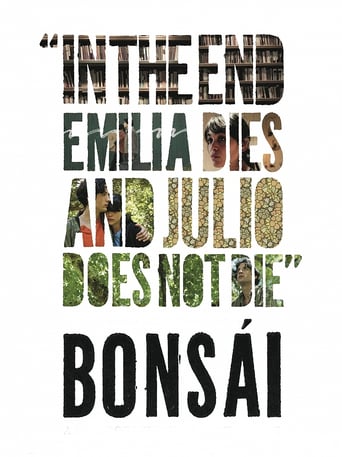Vashirdfel
Simply A Masterpiece
BoardChiri
Bad Acting and worse Bad Screenplay
Mischa Redfern
I didn’t really have many expectations going into the movie (good or bad), but I actually really enjoyed it. I really liked the characters and the banter between them.
Griff Lees
Very good movie overall, highly recommended. Most of the negative reviews don't have any merit and are all pollitically based. Give this movie a chance at least, and it might give you a different perspective.
Armand
a film like a spring wind. hot, perfumed, not very power, hided in grass and leaves. or memories and love. it is not exactly a great movie but it is bitter-refreshing. and that virtue is important in its case. because beyond words, a book and a small tree , the dreams, intentions, gestures and revelations, in almost childish - delicate manner are good opportunity for remind one of profound roles of cinema - to discover and open windows. the key is not the story, the atmosphere or image. but the lead actor who gives to film a special aura. and precise equilibrium. a film as a state of soul. who reminds old images and use well known symbols .realistic for the its vision about basic life aspects. seductive for the skin of trip between past and present. and for poetic flavor who saves, always, everything. because it is the film of a book and a bonsai.
R H
There are certain qualities that independent films tend to have- whether they were filmed in Chile or France, whether in Spanish or English. The awkward pauses, incomplete sentences, and seemingly unemotional reactions of characters are all independent traits that also appear in Bonsai. While these characteristics have always slightly annoyed me, this was the first film I've seen of this variety in which I was able to somewhat relate to at least one of the characters.Bonsai, deep down, is a romantic dramedy bouncing back and forth through time, showing us the life of a young(ish) writer/intellectual. Julio meets Emilia at a strange party, when he randomly asks her (it's not clear how well they know each other) if he can sleep in her bed with her. After some awkward dialogue, it is revealed that they both have a great love of books, and within minutes they are making sweet love. For the rest of the story we bounce back and forth between his growing relationship with Emilia and the present, eight years later, where he is stuck in an even stranger relationship with his neighbor, a woman called Blanca. Blanca and Julio's relationship consists of nightly visits to each other's apartments for some (yet again) awkward, but deeply intelligent conversations and passionate sex. They don't talk about themselves too deeply, instead their discussions revolve around what they are currently interested in. For Blanca, it is her translation work and for Julio it is a fake job that he has transcribing a novel for a somewhat famous writer. It appears Julio may also work at some kind of National Library, as he spends a decent amount of time there- sometimes helping out and other times selling his books.Meanwhile, in flashbacks we are treated to Julio's uber passionate true love romance with Emilia. There's seems like an almost perfect relationship; they spend there days walking in the park, drinking bagged liquor, talking about literature, and having great conversations. At night, they read together in bed (Emilia makes a rule that they must read to each other, out loud, every night) and then, more often then not, passionately make love. One day they decide to read all seven volumes of Proust, which if done at the rate of a page per night, would take between 10 and 20 years.In the present, Julio's fake job did involve a real interview with the semi-famous writer. Even though he doesn't get the job, he is told that the book starts with the protagonist learning over the radio that his first love has just died. Julio steals this beginning and works on a novel of his own, with the purpose of fooling Blanca into thinking he has an actual job.The story takes a strange and sad twist at the end, as Julio experiences loss, crushing depression, and what should be joy (it's hard to tell as I don't think he smiled once in the entire film) at the finishing of his novel. Julio and Emilia never do get a chance to finish Proust together, Julio and Blanca end their relationship on very strange terms, and the famous writer is lauded with praise for his new novel.If you like literature, dialogue, interesting characters, and heartbreak, you should go rent this grossly underestimated film.
cowboyandvampire
Bonsai is a sweet, sad and highly relatable Chilean love story about a lost young man, an aspiring novelist, who casually lies, passionately reads and – at least as an adult – idly romances his way through life. After telling his current lover he is transcribing a novel written in long-hand by a famous author, they bond more deeply over the process.To nurture that lie, and to give his own life some structure and purpose, he begins forging a copy – on the same notebooks and complete with coffee stains and cigarette ashes. His writing is clumsy at first, probably due to the fact that he has little experience to draw from, until he starts retelling his first love, with a beautiful free spirited girl.In a series of flashbacks, he remembers their meeting, their long romance, the passion and the lounging about reading and enjoying each other. That energy is channeled into the fake novel and his present day life is re-energized. Of course, we all know the first love doesn't survive and we travel back and forth in time to learn why, to watch as his current relationship slowly evolves and to find out if it is possible to recapture that youthful fervor as a more experienced – and more disappointed and disillusioned – adult.The bonsai, of course, is symbolic of the past relationship and his current aimlessness (no accident that the plant is not deeply rooted and exists as a carefully sculpted miniature of real life). It sounds corny, and ham-fisted, but works surprisingly well and while potted plants figure largely throughout, the bonsai itself is actually more of a breakthrough that adds a sliver of hope, albeit with tiny, tiny limbs.
jsrvm
BonsaiLike the gentle life of a bonsai plant, the love of Julio and Emilia grows slowly, survives delicately, and eventually, dies quietly. Director/writer Cristian Jimenez tells the mildly humorous story of the young Chilean couple's first relationship which sustained by literature, sex, and a complacent enjoyment of one another's presence as the days slowly drag on.Julio, a monotonous yet thoughtful university student first catches Emilia's eye at a small party in their seemingly motionless Chilean town. It seems that the time they first hook up is almost completely out of boredom, as the party is dying down, and they simply have nothing better to do. This passionless, comedic hookup leads to a playful, albeit sedated relationship that revolves around sex and literature.Jimenez uses a consistent, 8-year flashback and flash-forward from Julio's college life with Emilia to his adult life as a struggling, very much alone writer. Julio remains a static character throughout his life in terms of his passive, sarcastic demeanor as well as his tendency to constantly tell lies.Julio's lies are not serious, though they always catch up with him, undermining his relationship with Emilia as well as his ability to connect with those around him. Julio's first lie is in class, when a literature professor asks all the students who had done the assigned reading to raise their hands. As students slowly raise their hands surrounding him, Julio cluelessy gazes around and meekly raises his hand. This first, awkward and hilarious lie shows how Julio chooses the path of least resistance and foreshadows his future passionless relationship with Emilia.Julio's tendency to lie follows him into adult hood. He makes an offer to transcribe the novel of a well-established author, Gazmuri, onto the computer but is rejected, as his price is too high. He needlessly tells his current partner and neighbor, Blanca, that he had received the job. He begins writing his own novel by hand and for some reason, transcribes it to the computer when he is around Blanca. He titles the novel Bonsai, by Gazmuri, a loose autobiography of his past relationship with Emila. For some odd reason, he goes so far as to change his style of writing to cursive and to purposely spill tea and cigarettes on his notebooks in order to feign the authenticity of the journals.The story is riddled with literary references as well as an on going bonsai plant theme, which acts as a metaphor for the relationship that Julio and Emilia share as college students. In Julio's novel, he blatantly compares a relationship to a bonsai plant in a number of ways. To grow a bonsai, one must tie down the plant's branches in order to imitate the weight of snow in nature. The mildly depressing comparison is drawn to his own past relationship with Emilia, in which the two unceremoniously tied themselves down and took on each other's burden in order to remain together.Julio also makes a more cheerful and meaningful metaphor regarding the bonsai plant: once a bonsai plant is removed from its pot, it will no longer be a bonsai, but will grow like a normal plant. The connection here is that in order for a relationship to last, it must have a strong foundation. For Julio and Emilia, their relationship actually begun when they both found out they shared a strong love of literature. Unfortunately for them, they discovered this by both lying about having read a book by Proust, in order to seem like authentic literati. Despite quiet hilarity of them both attempting to discuss the pros and cons of a book that neither of them has read, this small lie along with a few others results in the eventual demise of their tender relationship.The overall message of Julio's story is quite complex and meaningful though possibly too complex some. Many of the countless references went right over my own head, though the more learned members of the audience definitely enjoyed the esoteric, literary jokes and metaphors and were laughing right along at key moments. Bonsai is obviously a must for bibliophiles, and despite catering to a select audience, overall, the story is quite attractive nonetheless, is edited and shot beautifully, and is an honest and fascinating look at first love lost. The story does roll out slowly, so be ready for a leisurely look at Julio's life.

